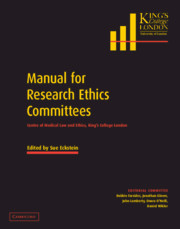Book contents
- Frontmatter
- Contents
- Editorial board
- Acknowledgements
- List of contributors
- Introduction
- Part I
- 1 The ethics of clinical research
- 2 Research ethics committees and the law
- 3 The regulation of medical research: a historical overview
- 4 The regulation of medical research in the UK
- 5 Observational and epidemiological research
- 6 Social survey research
- 7 Approaching qualitative research
- 8 Complementary and alternative medicine: challenges for research ethics committees
- 9 The ethical review of student research in the context of the governance arrangements for research ethics committees
- 10 The ethics of genetic research
- 11 Research or audit?
- 12 Randomised controlled trials
- 13 Determining the study size
- 14 Risk assessment for research participants
- 15 Absorbed radiation in patient and volunteer studies submitted to the ethical committee: a memorandum
- 16 A guide to the use of radioactive materials and radiological procedures for research purposes
- 17 Indemnity in medical research
- 18 The prevention and management of fraud and misconduct: the role of the LREC
- 19 Understanding clinical trials: a model for providing information to potential participants
- 20 The law relating to consent
- 21 Writing information for potential research participants
- 22 The law relating to confidentiality
- 23 Research involving vulnerable participants: some ethical issues
- 24 The ethics of research related to healthcare in developing countries
- Part II
- Index
23 - Research involving vulnerable participants: some ethical issues
Published online by Cambridge University Press: 08 January 2010
- Frontmatter
- Contents
- Editorial board
- Acknowledgements
- List of contributors
- Introduction
- Part I
- 1 The ethics of clinical research
- 2 Research ethics committees and the law
- 3 The regulation of medical research: a historical overview
- 4 The regulation of medical research in the UK
- 5 Observational and epidemiological research
- 6 Social survey research
- 7 Approaching qualitative research
- 8 Complementary and alternative medicine: challenges for research ethics committees
- 9 The ethical review of student research in the context of the governance arrangements for research ethics committees
- 10 The ethics of genetic research
- 11 Research or audit?
- 12 Randomised controlled trials
- 13 Determining the study size
- 14 Risk assessment for research participants
- 15 Absorbed radiation in patient and volunteer studies submitted to the ethical committee: a memorandum
- 16 A guide to the use of radioactive materials and radiological procedures for research purposes
- 17 Indemnity in medical research
- 18 The prevention and management of fraud and misconduct: the role of the LREC
- 19 Understanding clinical trials: a model for providing information to potential participants
- 20 The law relating to consent
- 21 Writing information for potential research participants
- 22 The law relating to confidentiality
- 23 Research involving vulnerable participants: some ethical issues
- 24 The ethics of research related to healthcare in developing countries
- Part II
- Index
Summary
One of the issues that causes concern and divergence of opinion for members of Research Ethics Committees is that of research involving vulnerable participants. Members of vulnerable groups are usually taken to include children, the mentally ill, people with cognitive impairment, elderly people and dying patients.
Common questions asked by REC members at the Centre of Medical Law and Ethics' Introductory Courses on the Ethics of Research on Humans have included whether research involving the terminally ill can ever be ethical, what constitutes minimal risk in the context of research involving children, how freely informed consent can be obtained in psychiatric studies and how effective research in dementia can be carried out.
Recognising the importance and complexity of these issues, the Centre of Medical Law and Ethics convened a series of Advanced Study Days bringing together practitioners and REC members to discuss the ethical issues raised in relation to paediatric research, psychiatric research, research into diseases of age and research into palliative care. Whilst in no way exhaustive, the following pages outline some of the interesting issues covered during these meetings.
This chapter has drawn on the presentations and discussions of all the plenary speakers, panel members and participants at the Centre of Medical Law and Ethics' Advanced Study Days on Paediatric Research, Psychiatric Research, Research into Diseases of Age, and Research into Palliative Care during 2000 and 2001.
The author would like to thank the following, in particular, for their presentations which have been adapted for this chapter: Dr Julia Addington-Hall, Mr Phil Bates, Dr Antony Bayer, Dr Calliope (Bobbie) Farsides, Professor Jonathan Glover, Professor Michael Gunn, Dr Vic Larcher, Dr Karen Le Ball, Dr Steven Luttrell, Dr Donald Portsmouth, Dr Diana Rose, Professor Sir Michael Rutter, Dr Nigel Sykes, Dr Teresa Tate.
- Type
- Chapter
- Information
- Manual for Research Ethics CommitteesCentre of Medical Law and Ethics, King's College London, pp. 103 - 110Publisher: Cambridge University PressPrint publication year: 2003
- 2
- Cited by

